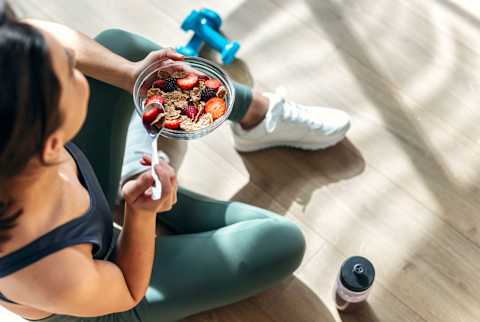7 Benefits Of Eating More Fiber That Go Beyond Better Bowel Movements


Fiber’s claim to fame has always been its ability to keep you regular. It does so by adding bulk to your stools (so you actually have something to pass), regulating gut transit time (how long it takes to move food through your digestive tract, and improving consistency.*
But the benefits of this critical carb don’t stop there. Here are 7 other ways eating more fiber can improve your health.
Benefits of eating more fiber
Before we dive in, let's quickly review what fiber is. Fiber is a carbohydrate found exclusively in plants. It’s unique in that it’s not digested by the body.
It may seem odd to increase your consumption of something you're just going to eliminate, but fiber aids so many critical processes in the body.
- Lower blood sugar: Fiber helps slow the digestion and absorption of carbs, leading to a steadier rise in blood sugar and fewer spikes and crashes (to also keep you full).
- Lower cholesterol: Soluble fiber (fibers that absorb water and form a gel-like consistency in the gut) binds to bile acids in the gut, helping your body flush out excess LDL cholesterol. We further break down fiber’s role in cholesterol and how much you need to eat daily to see a difference here.
- Detox microplastics: Early research suggests fiber may bind to environmental toxins and microplastics in the gut—clearing them from your system.
- Feed good gut bacteria: While we can’t digest fiber, the microbes in our gut can. Prebiotic fibers are ones that the good bacteria (not the bad) in the gut are able to feed on and ferment. This fermentation helps good bacteria continue to flourish in the gut and produces short-chain fatty acids (like butyrate), which lower inflammation and support the gut lining1.
- Sleep deeper: Eating a fiber-rich diet is linked to deeper, more restorative sleep2 (thanks to the gut-brain axis).
- Soothes gum inflammation: Fiber-rich foods promote saliva production and reduce inflammation that can lead to gum disease.
- Boosts GLP-1: GLP-1 is a hormone that the body naturally produces that helps regulate blood sugar, appetite, and digestion. Fiber’s impact on SCFA production and slowed digestion stimulates the secretion of GLP-1, further supporting insulin sensitivity and appetite regulation.
How to get more fiber
Most of us would benefit from increasing our fiber intake. In fact, nearly 95% of Americans are falling short of the recommended 25-38 grams3 of fiber a day.
Make sure to include a variety of high-fiber foods on your plate at each meal. These include:
- 1 cup lentils: 16 grams
- 1 cup black beans: 16 grams
- 1 avocado: ~13.5 grams of fiber
- ½ cup dry oats: 4 grams of fiber
- 1 cup quinoa: 4 grams of fiber
- ½ cup berries: 4-8 grams of fiber
- 1 cup Brussels sprouts: 3 grams of fiber
But even if you eat super healthy, it’s still easy to miss the mark on your daily fiber goal. And that’s where a high-quality supplement can come in.
The right fiber supplement provides a clinically studied source of fiber (like guar beans or psyllium husk) at a meaningful dose (look for around 6 grams of fiber per serving). We did the work for you to find the best fiber supplements out there. Here's our expert-vetted picks.
The takeaway
Fiber has a huge impact on your overall health. And it’s a nutrient we’re likely not getting enough of without significant effort. Try these easy swaps to increase your fiber intake or opt for a daily fiber supplement for even more targeted support.
